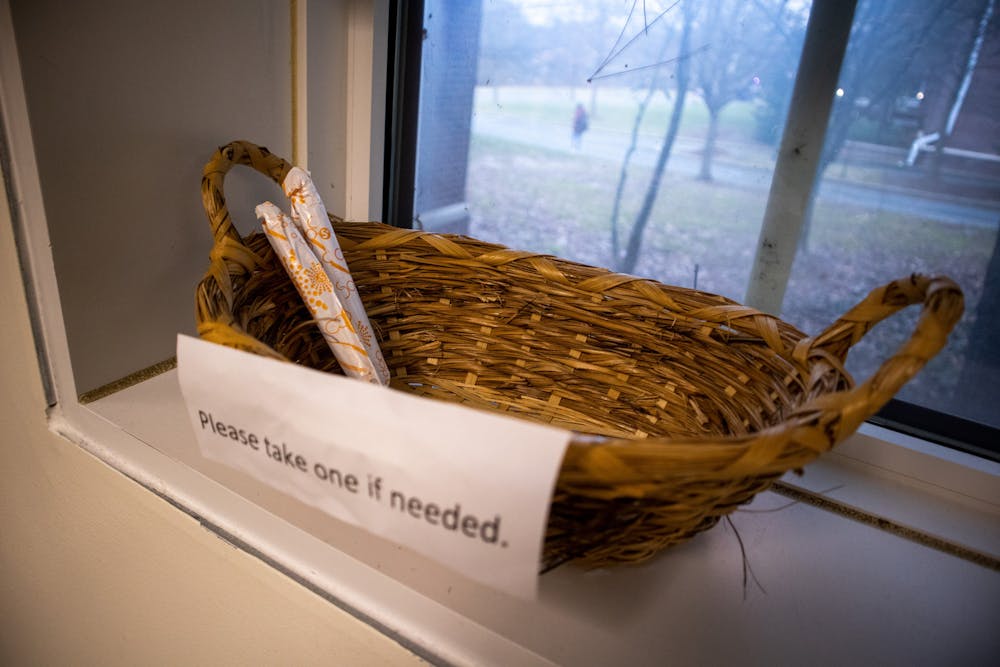By Rachel Lea
Correspondent
Student Government passed a resolution in November asking the College administration to consider a pilot program that would place menstrual products in bathrooms across campus. Although the administration commended the student organization for spearheading such an initiative, they announced in a letter sent a month later that they were unwilling to proceed with the proposal due to budget cuts.
“I was tremendously disappointed that the College decided to reject our proposal,” said Jared Williams, executive vice president of SG and junior political science major. “A menstrual product program would indubitably have a positive impact on all students and improve the quality of life.”
Currently, menstrual products are distributed in the Office of Inclusive Excellence, Student Health Services, The Shop in Campus Town and various offices in the Brower Student Center. The School of Education is one of only a few academic schools to offer such a program, with products provided in the Education Building by the Dean’s Office. The School of Engineering also provides menstrual products in Armstrong Hall, according to Dean Andrea Welker of engineering.
Gabriela Rivera-Peña, a fifth-year elementary special education and women’s and gender studies major, helped to initiate the program after she emailed one of their previous professors about the lack of access.
“Menstrual products are just as important as toilet paper,” said Rivera. “If I am in the Education Building, going to Student Health Services [for menstrual products] while I am in class is not really ideal. It is just like in a regular public bathroom [with] dispensers, except that these are free.”
With Rivera’s assistance, SG hoped to expand this program to include the bathrooms in the Student Center and the library, but the College administration would pay for it instead. Catherine Lillja, an SG delegate and sophomore mathematics major, introduced the bill after a lack of access to menstrual products began to interfere with her school work.
“New Jersey public school districts are required to provide menstrual products free to their students,” said Lillja, “and I see no reason why higher education should not be held to these same standards.”
Joe Woods, vice president of governmental affairs and senior computer engineering major, hoped that SG’s program would have made the College an example to other schools by demonstrating the initiative’s sustainability and low cost to students. He, Lillja and the rest of Student Government also hoped that this program would encourage conversations on menstrual health and make the College a more inclusive environment.
“What motivates me more is the recent step back in reproductive rights and education
across the nation,” said Lillja. “If we cannot do something as simple as talking about menstrual health, it is hard for me to believe that we can have a productive conversation about other pressing issues too.”
Many students – both in and out of SG – are surprised that this menstrual product proposal was not approved.
“I would say that [the program] is overdue,” said Elizabeth Klein, a junior English major. “I do not really see what is to be gained from rejecting it.”
Other students, however, are not surprised that such a proposal was not given proper attention.
“Menstruation is still a very taboo topic,” said junior English and women and gender studies double major Roshni Dave. “But [the College] is an institution; they should get over that.”
Yuliia Sul, vice president of inclusive excellence and senior political science major, stressed that the main concerns the administration had were maintenance costs and supply management.
“I know the College is trying to lessen how much money [it] is spending,” said Dave. “[But] all of it kinda adds up to make college more inaccessible and less equitable.”
Students like Klein also cannot help but suspect that the topic of menstruation itself played a significant role in the administration's decision to reject it.
“I never want to rule that out,” said Klein. “Because it makes people uncomfortable, and it is not deemed as super important, even though it is.”
SG members plan to take a similar approach to Rivera and implement it into each of the academic schools by persuading the deans, who may be more receptive.
Williams said that SG will continue to advocate for menstrual health, regardless of the outcome.
“I hope to use this as motivation to work even harder at bringing about this program that students want to see,” said Williams.
Correction Feb. 19: A previous version of this article stated that the School of Education was the only school to offer menstrual products. The School of Engineering provides menstrual products in Armstrong Hall as well.







